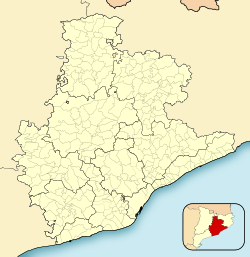| Guardiola de Berguedà | |
|---|---|
| Municipality | |
 St. Laurence's church, Guardiola St. Laurence's church, Guardiola | |
 Flag Flag Coat of arms Coat of arms | |
  | |
| Coordinates: 42°14′6″N 1°52′52″E / 42.23500°N 1.88111°E / 42.23500; 1.88111 | |
| Country | |
| Community | |
| Province | Barcelona |
| Comarca | Berguedà |
| Government | |
| • Mayor | Josep Pere Lara Tristante (2015) (CiU) |
| Area | |
| • Total | 61.7 km (23.8 sq mi) |
| Elevation | 720 m (2,360 ft) |
| Population | |
| • Total | 887 |
| • Density | 14/km (37/sq mi) |
| Demonym(s) | Guardiolenc, guardiolenca |
| Website | guardioladebergueda |
Guardiola de Berguedà (Catalan pronunciation: [gwəɾðiˈɔlə ðə βəɾɣəˈða]) is a municipality in the comarca of the Berguedà in Catalonia. It is situated at the confluence of the Bastareny and Llobregat rivers in the north of the comarca. It is an important local commercial centre, and for this reason has been less affected by depopulation than other municipalities in the Berguedà. The extraction of lignite is also important to the local economy. The town is served by the C-1411 road from Berga to the Cadí tunnel, and is linked to La Pobla de Lillet and Castellar de n'Hug by the B-402 road. The municipality includes a large exclave to the north-west.
Riutort asphalt mine

At the beginning of the 20th century, the Riutort asphalt mine (42°15′08″N 1°55′18″E / 42.252103°N 1.921634°E / 42.252103; 1.921634) was exploited by the Riutort Mining Company, which was owned by the Frenchmen Jules Claviez and Philipp Petit. They extracted bituminous loam and transported this on mules to the distillation factory, where petrol was extracted from the asphalt.
A few years after being set-up, the mine closed because of insufficient production. It is open to the public in guided groups, which descend approximately 340 metres into its depths, to see its extensive galleries, which still drip petroleum from the rock walls and experience the strong smell associated with fossil fuels. It is one of the few underground petroleum mines in the world, an exceptional historical curiosity from the industrial revolution in Berguedà. In order to preserve and protect its wealth of fauna (Pyrenean newts, salamanders and bats), some parts of the mining installations have been excluded from the tourist access.
Demography
| 1900 | 1930 | 1950 | 1970 | 1986 | 2007 |
|---|---|---|---|---|---|
| 589 | 1336 | 1334 | 1848 | 1312 | 948 |
References
- "Ajuntament de Guardiola de Berguedà". Generalitat of Catalonia. Retrieved 2015-11-13.
- "El municipi en xifres: Guardiola de Berguedà". Statistical Institute of Catalonia. Retrieved 2015-11-23.
- Municipal Register of Spain 2018. National Statistics Institute.
- Mina de Petroli de Riutort: culture - monuments and cultural sites
- www.minadepetroli.com
- Panareda Clopés, Josep Maria; Rios Calvet, Jaume; Rabella Vives, Josep Maria (1989). Guia de Catalunya, Barcelona: Caixa de Catalunya. ISBN 84-87135-01-3 (Spanish). ISBN 84-87135-02-1 (Catalan).
External links
- Official website (in Catalan)
- Government data pages (in Catalan)
| Places adjacent to Guardiola de Berguedà | ||||||||||||||||
|---|---|---|---|---|---|---|---|---|---|---|---|---|---|---|---|---|
| ||||||||||||||||
This Province of Barcelona location article is a stub. You can help Misplaced Pages by expanding it. |
